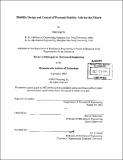Mobility design and control of personal mobility aids for the elderly
Author(s)
Yu, Haoyong, 1966-
DownloadFull printable version (10.19Mb)
Other Contributors
Massachusetts Institute of Technology. Dept. of Mechanical Engineering.
Advisor
Steven Dubowsky.
Terms of use
Metadata
Show full item recordAbstract
Delaying the transition of the elderly to higher level of care using assistive robotic devices could have great social and economic significance. The transition, necessitated by the degradation of physical and cognitive capability of the elderly, results in drastic increase of cost and rapid decrease of quality of life. A Personal Aid for Mobility and Health Monitoring system (PAMM) has been developed at MIT Field and Space Robotics Laboratory for the elderly living independently or in senior assisted living facilities so as to delay their transition to nursing homes. This thesis research addresses the mobility design and control issues of such devices. Eldercare environments are semi-structured, usually congested, and filled with static and/or dynamic obstacles. Developing effective mobility designs to achieve good maneuverability is a great challenge. An omni-directional mobility concept using conventional wheels has been developed independently in this research. Mobility systems based on this concept are simple, lightweight, energy efficient, and capable of operating on a range of floor surfaces. Assistive mobility devices work in shared workspace and interact directly with their users with limited physical and cognitive capabilities. The users may not be well trained, nor fully understand system. The challenge is to design an ergonomic and intuitive human machine interaction and a control system that can properly allocate control authority between the human and the machine. For this purpose, the admittance-based control methodology is used for the human machine interaction control. An adaptive shared control framework allocates control based on metrics of the demonstrated human performance has been developed. (cont.) Substantial amount of field experiments have been conducted with the actual users to validate control system design. The mobility design and control system implemented and tested on PAMM, will also be applicable to other cooperative mobile robots working in semi-structured indoor environments such as a factory or warehouse.
Description
Thesis (Ph. D.)--Massachusetts Institute of Technology, Dept. of Mechanical Engineering, 2002. Includes bibliographical references (p. 127-130).
Date issued
2002Department
Massachusetts Institute of Technology. Department of Mechanical EngineeringPublisher
Massachusetts Institute of Technology
Keywords
Mechanical Engineering.